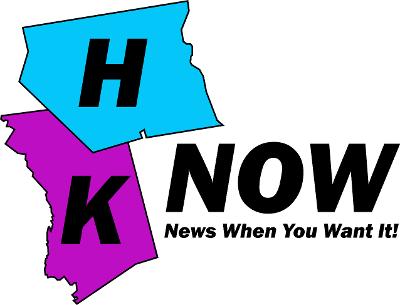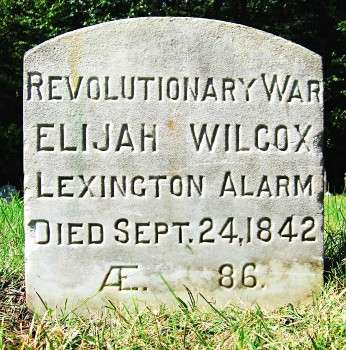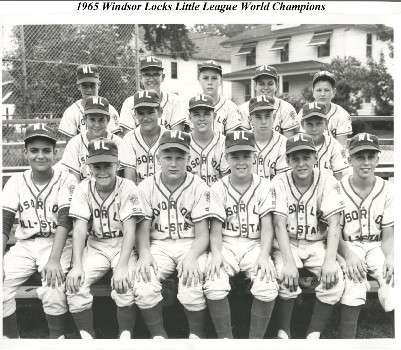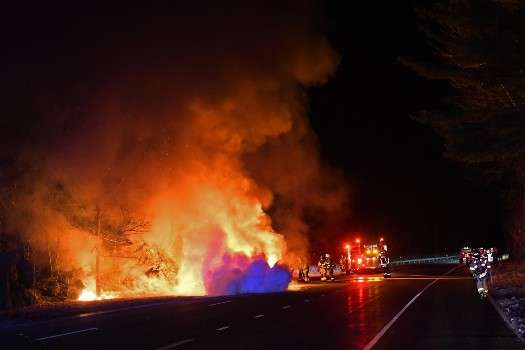By Thomas L. Lentz, Killingworth Municipal Historian
(April 1, 2025) — The Battles of Lexington and Concord, fought on April 19, 1775, were the first military engagements of the American Revolutionary War, marking the beginning of armed conflict between the British and the colonial militias. This year marks the 250th anniversary of this first battle. Right after the battle, a notice, known as the Lexington Alarm, was sent out to the colonies to inform them of the battle and to muster the militia.
Lieutenant Colonel Francis Smith received orders from General Thomas Gage in Boston on the afternoon of April 18, 1775 with instructions that he was to proceed from Boston “with utmost expedition and secrecy to Concord, where you will seize and destroy … all Military stores …” Dr. Joseph Warren, in Boston, a zealous champion of American liberty, learned of the British march into the countryside. He dispatched William Dawes and Paul Revere by separate routes to warn John Hancock and Samuel Adams in Lexington. Revere implemented a prearranged plan to alert a series of alarm riders and had two signal lanterns placed in the North Church belfry before setting out for Lexington. Both men reached Lexington about fifteen miles to the northwest at midnight.
The march of 800 British troops under the command of Lieutenant Colonel Francis Smith had almost reached Lexington by 4:00 a.m. on April 19th. When it became obvious that the colonial militia was assembling throughout the countryside, an urgent request for reinforcements was sent back to General Gage in Boston. General Gage ordered a second brigade of 1,000 men under Brigadier Earl Percy to leave Boston to support the first column. The British encountered militiamen in Lexington, resulting in a skirmish that killed eight colonists, and then marched on to Concord. When the British began to return to Boston, they were continually ambushed by Minute Men shooting from behind trees, rock walls, and buildings.
The first news of the Lexington battle was brought to General Joseph Palmer, an important member of the Massachusetts Committee of Safety, in Watertown by a drum-beating messenger early in the morning. When the news reached him from Boston that a second brigade was coming out to support the first, he realized that help would be needed by the colonial militia as well. He immediately dispatched a letter that has become known to historians as the Lexington Alarm. The letter described the battle and included the statement that the Bearer, Israel Bissell, “is charged to alarm the country quite to Connecticut and all persons are desired to furnish him with fresh horses as they may be needed.”
The “bearer,” Israel Bissell, a twenty-three old express rider from East Windsor, Connecticut, set out along the Boston Post Road toward Worcester about thirty-six miles away. Before noon, Bissell arrived in Worcester dusty and tired shouting, “To arms, to arms, the war has begun!” His fast white horse, spent with fatigue, fell dead near the meetinghouse and Palmer’s plea for additional horses became prophetic. Early the next morning, Thursday, April 20th, Palmer’s dispatch left Worcester traveling south toward Connecticut.
The route south from Worchester was a principal road that would take the rider through Norwich to New London. The express rider arrived in New London about 7:00 p.m. At each town, the letter was copied and endorsed and sent by express rider to the next town. It reached Saybrook at 4:00 a.m. on Friday morning, April 21. It reached Killingworth at 7:00 a.m., East Guilford at 8:00, and Guilford at 10:00. It was carried along the shoreline, stopping at each town and reaching New York City at 4:00 p.m. on Sunday, April 23, 1775. It arrived in Philadelphia, 350 miles away from its origin, at 5:00 p.m. on April 24th. It eventually reached Charleston, South Carolina.

At that time, all towns were obligated to form militia companies composed of all males sixteen years of age and older (there were exemptions for some categories) and to ensure that the members were properly armed. As the Lexington Alarm reached towns, large numbers of able-bodied men from Connecticut began assembling to march “for the relief of Boston.” This gathering of militia was both orderly and spontaneous, although no official colony action had been authorized. In many cases, the militia marched off under their officers without orders or with only local instructions. The fifty-three men from Killingworth who participated in the Lexington Alarm are listed below (Killingworth then included present Killingworth and Clinton).
Although the militias arrived after the battle, General Gage found Boston faced by a huge militia of 20,000 men who had arrived from throughout New England. Their large numbers insured that the British would remain confined in Boston. The men from Killingworth spent six days in service. Billeting cost 1 shilling 6 pence per day for each man, for a total cost of 23 pounds, 2 shillings, and 2 pence.
Photo by Thomas L. Lentz. Patriot Marker for Elijah Wilcox, Southwest District Cemetery
| Men from Killingworth who marched “for the Relief of Boston in the Lexington Alarm” | |
| Samuel Gale, Captain
Aaron Stevens, Captain Job Wright, Ensign Joseph Hilliard, Sergeant Samuel Pierson, Sergeant Nathaniel Redfield, Sergeant Job Buell, Private John Buell, Private Reuben Buell, Private Samuel Buell, Private Daniel Chapman, Private John Chatfield, Private Ebenezer Chittenden, Private Samuel Chittenden, Private Philip Clark, Private Jesse Cone, Private Peter Davis, Private Samuel Franklin, Private George Griswold, Private James Hill, Jr, Private Elnathan Hurd, Private Reuben Hurd, Private Levi Kelsey, Private Moses Kelsey, Private Oliver Kelsey, Private David Labarron, Private Samuel Lewis, Private |
Sylvanus Meigs, Private
Jonathan Murray, Private George Nettleton, Private Ithiel Parmelee, Private John Parmelee, Private Martin Redfield, Private Philip Redfield, Private Samuel Rutty, Private Job Seaward, Private Reuben Stevens, Private Timothy Teal, Private Titus Teal, Private Caleb Turner, Private Eli Turner, Private Orib Turner, private Ambrose Ward, Private Ichabod Ward, Private Barnabus Wellman, Private Robert Wilkinson, Private Thomas Wilkinson, Private Elijah Willcox, Jr., Private Giles Willcox. Private Samuel Willcox, Private Joseph Willson, Private James Wright, Private Nathan Wright, Private |











